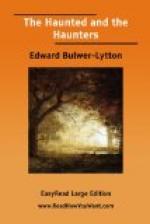“And how far,” asked the clergyman, “is the moor from Lanreath?”
“About two miles, and please your reverence. The whole parish is so frightened, that few will venture far after nightfall, for it has of late come much nearer the village. A man who is esteemed a sensible and pious man by many, though an Anabaptist in principle, went a few weeks back to the moor (’tis called Blackadon) at midnight, in order to lay the spirit, being requested thereto by his neighbours, and he was so alarmed at what he saw, that he hath been somewhat mazed ever since.”
“A fitting punishment for his presumption, if it hath not quite demented him,” said the parson. “These persons are like those addressed by St Chrysostom, fitly called the golden-mouthed, who said, ’Miserable wretches that ye be! ye cannot expel a flea, much less a devil!’ It will be well if it serves no other purpose but to bring back these stray sheep to the fold of the Church. So this story has gained much belief in the parish?”
“Most believe it, sir, as rightly they should, what hath so many witnesses,” said the sexton, “though there be some, chiefly young men, who set up for being wiser than their fathers, and refuse to credit it, though it be sworn to on the book.”
“If those things are disbelieved, friend,” said the parson, “and without inquiry, which your disbeliever is ever the first to shrink from, of what worth is human testimony? That ghosts have returned to the earth, either for the discovery of murder, or to make restitution for other injustice committed in the flesh, or compelled thereto by the incantations of sorcery, or to communicate tidings from another world, has been testified to in all ages, and many are the accounts which have been left us both in sacred and profane authors. Did not Brutus, when in Asia, as is related by Plutarch, see——”
Just at this moment the parson’s handmaid announced that a person waited on him in the kitchen,—or the good clergyman would probably have detailed all those cases in history, general and biblical, with which his reading had acquainted him, not much, we fear to the edification and comfort of the sexton, who had to return to Lanreath, a long and dreary road, after nightfall. So, instead, he directed the girl to take him with her, and give him such refreshment as he needed, and in the meanwhile he prepared a note in answer to Mr Mills, informing him that on the morrow he was to visit some sick persons in his parish, but that on the following evening he should be ready to proceed with him to the moor.
On the night appointed the two clergymen left the Lanreath rectory on horseback, and reached the moor at eleven o’clock. Bleak and dismal did it look by day, but then there was the distant landscape dotted over with pretty homesteads to relieve its desolation. Now, nothing was seen but the black patch of sterile moor on which they stood, nothing heard but the wind as it swept in gusts across the




